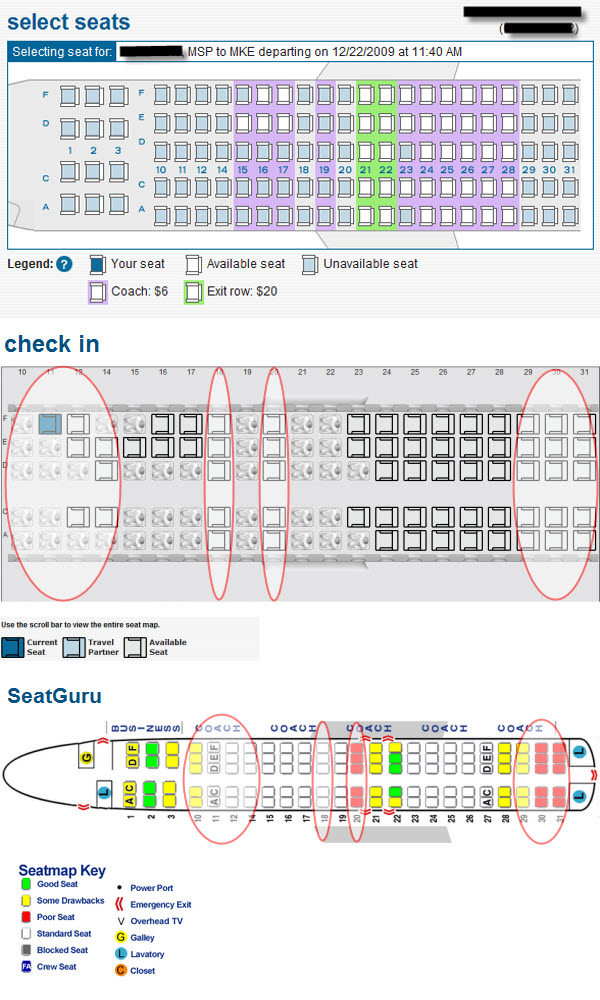It is time for superlative awards to be bestowed upon the best and worst of the past year. Groups that have won accolades throughout the year are recognized for their contributions, many the result of planned actions that were specifically designed and executed to garner awards.

The best in travel faced off against... the other guys... when the dust settled, the winner was...
Instead of highlighting the obvious top achievements in travel marketing or operations, the 2009 Unsuspecting Travel Hero and Unsuspecting Travel Zero awards recognize the foremost examples of customer generosity or customer hostility that occurred as a direct result of company policy or standard practice.
In essence, the awards recognize organizations that “get it” or “don’t get it” when it comes to engaging the customer, eliminating unnecessary obstacles, and providing exemplary customer-centric operations.
The two great high profile travel achievements of the year were, in marketing, Tourism Queensland’s innovative and widely celebrated “Best Job in the World” campaign and for operational excellence, obviously, US Airways’, and more specifically – Captain Chesley “Sully” Sullenberger’s, “Miracle on the Hudson.”
At the other end of the spectrum were the high profile cases of all the major US carriers (except, thankfully Southwest) playing a spirited round-robin game of raise the bag fees and Continental Express / ExpressJet’s Rochester, Minnesota overnight hostage debacle.
While the above stories, for very good reason, grabbed headlines, two smaller stories went relatively unnoticed. These two smaller stories are interesting as they illustrate the customer orientation dichotomy arising within the travel industry. The best example was Four Seasons Hotels’ effective and timely application of social media, and the worst was AirTran’s irrational advance seat assignment surcharge policies.

Four Seasons Resort - The Biltmore - Santa Barbara: Winner of the 2009 Unsuspecting Travel Hero Award
2009 Unsuspecting Travel Hero Award – Four Seasons Resort – The Biltmore, Santa Barbara
Blogger Charyn Pfeuffer contributed an article to the Hotel Chatter blog about her experience at the Four Seasons Biltmore in Santa Barbara while attending the Alaska Media Road Show, sponsored by the Alaska Travel Industry Association.
During her stay she posted this message as @global_gourmet on Twitter: “Okay, the turndown music in my room at Four Seasons Biltmore is so not soothing. More appropriate for a funeral or beheading. #alaska”
The following day, she found a bottle of Syrah in her room with the following personal note from the hotel’s Director of Housekeeping: “It was brought to my attention that our turndown music was not to your satisfaction. Please accept my sincerest apologies as this was certainly not our intention to start your stay on this note. I have enclosed a listing of our local radio channels in hope that you may find a channel to your liking. If there is anything else that we can do to improve your stay, please feel free to call.”
Pfeuffer did a bit of research and discovered that Four Seasons’ corporate office was monitoring Twitter, saw the snarky tweet and contacted The Biltmore to discover who sent it. Due to the #alaska hashtag, Biltmore staff then approached the ATIA organizers to identify @global_gourmet so they could address the issue.
 photo credit: Four Seasons Hotels
photo credit: Four Seasons HotelsFour Seasons Hotels and its Santa Barbara Biltmore Resort prove they sincerely care about their guests' experience and that the little things matter.
What is notable is that the hotel was not taking special measures to impress an influential blogger – this was an example of a standard process in action. The hotel chain corporate office was monitoring the social networks, proactively managing its brand reputation. When the head office contacted the hotel, they had no idea it was a blogger who had tweeted about the music selection.
Even more importantly, it was unlikely the hotel even created the issue. It seems that the haunting music could have easily been a music selection from a classical radio station that was broadcasting Halloween themed music at the time Pfeuffer returned to her room. Regardless of the cause, the hotel tried to do the right thing – correct the issue and make amends with the guest.
What is particularly refreshing is that the hotel’s response was proactive, sincere and solely intended as personal communication with the guest. It was the blogger who publicized the events, not the hotel company trumpeting self-congratulation through a press release. One can only assume that if a hotel company can handle a relatively minor situation like the radio station selection for turn down service so expertly, they would be more inclined to dedicate greater effort to correct more significant issues impacting their guests.
2009 Unsuspecting Travel Zero Award – AirTran Airways – Seat Assignment Policy
AirTran has created a unique process for securing seat assignments when booking a flight reservation. Like many other carriers, they now assess incremental fees for premium seat assignments. While this represents another measure to extract higher revenues per passenger without increasing airfares, that is not the issue.
AirTran has structurally eliminated the ability for most travelers to book seat assignments without paying premium fees. Only travelers that book in Business or “Regular” Coach (Y, B or M) class may select their seat assignment at the time of booking with no fee. Travelers on discounted coach fares must pay $6.00 per seat on each one-way trip for the privilege of an advance seat assignment.
What makes this policy particularly unique is that by integrating its premium seating fees and advance seat assignment policies, AirTran not only creates unnecessary traveler inconvenience, but actually limits the seating options for individuals opting to pay the advance seat assignment fee. As a result, AirTran has created a new passenger service formula CH3 = Customer Hostility Cubed.
Here is how it works – I will use a Minneapolis to Milwaukee flight on an AirTran Boeing 717 aircraft as an example: First, let’s review AirTran’s Premium Seating Pricing Policy –
- AirTran’s 717-700 fleet is configured with 21 rows of 5 seats, or 105 total coach seats
- Fifty seats (47.6%) are allocated as premium coach seats with a $6.00 surcharge – Rows 15-17 (15 seats), 19 (5 seats) and 23-28 (30 seats)
- Ten seats (9.5%)are classified as exit rows, with a $20.00 surcharge – Rows 21-22 (10 seats)
- The remaining 45 seats (42.9%) are not surcharged – Rows 10-14 (20 seats – there is no row 13), 18 (5 seats), 20 (5 seats) and 29-31 (15 seats)
However, due to AirTran’s advance seat assignment policy at the point of booking, only the sixty seats (57.1% of coach seats) that are offered with the $6.00 or $20.00 a surcharge are made available to the traveler – even though other non-surcharged seats are not assigned to other passengers. Interestingly, AirTran constrains the ability of passengers – even those willing to pay the advance seat assignment fee – to select unreserved seats.
This policy makes little sense – it eliminates passenger options and creates arbitrary barriers to a fundamental process that impacts the vast majority of coach travelers. One would think that if someone wanted to book an undesirable seat where no additional fee is required, AirTran would be happy to collect their money.
Alas, no – AirTran makes certain that individuals must wait until 24 hours before the flight to select even an awful seat (even though sitting in that seat would normally be considered sufficient punishment…)
Below is a comparison of an AirTran 717-700 seat map at booking and check-in (screen shots taken simultaneously) and how these maps compare against the SeatGuru.com seat map profile:
It is difficult to categorize the 45 non-surcharged coach seats. They are not made available for advance assignment by discounted fares, but they oddly represent both the best and the worst seats in the class.
The following are some highlights of the seats that are not surcharged as premium seats –
- The five bulkhead seats (row 10) are prioritized for individuals with disabilities and are not normally available until check-in on the day of the flight
- Rows 11, 12 & 14 represent the best 15 coach (non-exit row) seats available on the aircraft
- The five seats in row 18 are typical coach seats, no different from the rows immediately in front or behind that are both surcharged $6.00 as premium seats
- Row 29’s five seats (as well as the five seats in row 28 that carry a $6 “premium” surcharge) receive a caution flag from SeatGuru due to engine noise
- The five seats in row 20 not only don’t recline due to the exit row, but are also located in the last boarding area, so overhead space may be limited
- The 10 seats located in rows 30-31 are the worst on the plane – they do not recline, are loud due to engine proximity, are located near the lavatories, and best of all, have no windows.
Highlighting that last point, it becomes a bit ironic that AirTran does not accept pets as checked baggage. It seems that pets traveling in a heated & pressurized section of the baggage compartment could have a better inflight experience than those in the last rows of AirTran’s passenger cabin. OK, there is no lavatory access, but pets have a private kennel (no middle seat encroachment,) are able to lie down and are not subjected to the deafening engine noise and door slamming / flushing sounds from the lavatory. If faced with a choice between seat 31E and a kennel, it could be a tough decision.
To add insult to injury, due to AirTran’s “Rotating Zone” boarding policy, most non-surcharged seats board before the vast majority of the seats with premium surcharges. If one wants to guarantee the combined benefit of a decent seat (according to SeatGuru) with boarding priority by paying a fee at the time of booking, only row 27 is in the first coach boarding group (rows 27-31) and row 15 is in the second group (rows 10-15) meet that criteria.
If the middle seats in each row are eliminated, this translates to eight seats (7.6%) from the coach cabin that might be considered to offer value for the $6.00 advance seat assignment fee. This also means non-surcharged rows 11-14 (12 seats excluding the middle seats) offer superior value when compared with all other premium coach seats. It is a shame that they cannot be reserved in advance, even by paying a surcharge, by flyers on discounted coach tickets – especially since AirTran is not earning incremental revenue by charging for these seats.
Even the ten exit row seats, with the $20 surcharge, have issues that undermine their premium valuation –
- The 5 seats in row 21 have extra legroom, but limited recline due to the exit row behind. Window seats A & F may be missing part of their outside armrests, and have less than standard seat padding. Seat E is a middle seat. Row 21 is also in the last coach boarding group.
- Row 22 is better than row 21 as they have both extended legroom and all fully recline, but the two window seats have the same smaller armrests and less padding. Seat E remains a middle seat.
Only the two aisle seats in row 22 could be considered worth the $20 premium fee. It is sad to see that only 20% of the surcharged exit row seats actually provide the combination of extended legroom, full armrests and standard seat padding.
Only eight $6.00 and two $20.00 surcharged coach seats that provide legitimate premium value represent less than 10% of the available coach seating inventory. It is unfathomable that AirTran insists on inconveniencing 100% of its discount-fare coach passengers to mandate payment for seat assignments that offer only 9.5% of coach travelers any tangible benefit.
Strategically, this does not position AirTran well against rival low cost carrier Southwest – an airline that does not provide seat assignments. To provide compelling product differentiation relative to Southwest, one would think AirTran would want to provide its flyers with the best advance seat assignment experience and value.
AirTran could possibly defend its policies by stating that passengers wanting to book any seat can simply pay for a full-price coach fare. Given that it is difficult to justify the $6-$20 premium seating surcharge, paying a Y, M or B fare to guarantee a good seat (ideally in the 12 window or aisle seats located in rows 11, 12 or 14) is a ridiculous notion.
Of course, if the discount coach traveler waits until 24 hours prior to departure and selects a seat when checking in online, any coach seat (except the exit rows) may be selected, including the desirable seats located toward the front of the coach cabin, as the premium seat surcharge disappears.
I won’t waste any more time discussing why AirTran deserved the worst of the worst title – I believe its combined premium seat pricing, advance seat assignment and rotating boarding policies provide a structural gauntlet that is fundamentally customer-hostile.
AirTran’s seating policies disrespect both the intelligence and the time of its customers. It appears that only a small minority of passengers can benefit by paying for advance seat assignments, while all passengers traveling on discounted coach tickets are inconvenienced. That is a poor ratio.
For those of you who think I am one of those “Hotels Rule / Airlines Drool” type of people, there have been good examples of admirable / unanticipated good airline behavior – for example, Southwest Airlines doing everything right during the recent Nor’easter in Philadelphia by:
- communicating honestly and frequently with passengers
- giving the passengers with options when available
- ensuring passenger comfort and safety, while attempting to transit the passengers as soon as possible
- providing a gesture of goodwill when falling short of an objective, even when circumstances were beyond their control
Kudos to Southwest, they did a great job. But, why did Southwest lose out when compared with Four Seasons? Four Seasons reacted to an unplanned event and responded in a highly individualized manner to what could be considered a relatively small issue. A Nor’easter is a big event that occurs with advance notice – it enables advance planning.
Southwest did a great job responding in a way that most travelers would consider an ideal manner; Four Seasons responded in a manner that exceeded all reasonable expectations.
That is what makes Four Seasons a great company – Chairman Isadore Sharp has always set the standard as The Golden Rule – treating each guest with respect as an individual, in a manner one would desire to be treated themselves; and to exceed the expectations of their demanding and sophisticated clientele. Mission accomplished – it is truly the little things that count.
Do you have an example of other deserving Unsuspecting Travel Heroes or Zeroes? Let me know by adding a comment. Remember, the ground rules require that the actions must be based on company policy – As remarkable as Captain Sullenberger’s landing on the Hudson River might have been, it was a monumental personal effort – not something that could be characterized as a standard US Airways company policy.
Competition Details: The 2009 Unsuspecting Travel Hero and 2009 Unsuspecting Travel Zero Awards were created by and are judged solely by Robert Cole, author of the Views From a Corner Suite blog. The judging criteria are confidential and all decisions are final. There is no application process and organizations promoting their own accomplishments are immediately disqualified from consideration.





